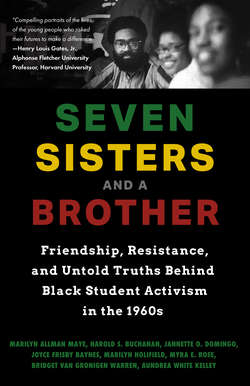Читать книгу Seven Sisters and a Brother - Joyce Frisby Baynes - Страница 1
На сайте Литреса книга снята с продажи.
ОглавлениеPraise for
Seven Sisters and a Brother
“In this fascinating group narrative, the organizers of Swarthmore College’s 1969 eight-day sit-in join voices to tell the story of how ‘Seven Sisters and a Brother’ used peaceful protest to effect change. Looking back on the events of fifty years ago, the authors have combined their stories as a ‘choral memoir’ of the Takeover which forced their college to respond to the demands of Swarthmore’s Afro-American Students Society. As well as a history of their activism, this account includes the authors’ own autobiographies, providing compelling portraits of the lives of the young people who risked their futures to make a difference.”
—Henry Louis Gates, Jr., Alphonse Fletcher University Professor, Harvard University, author of Stony the Road: White Supremacy and the Rise of Jim Crow
“Seven Sisters and a Brother illuminates the institutional failures of an elite liberal arts college in the 1960s and the work of a dedicated group of Black students to change the culture and policies of their school. Theirs is a story of the power of collective action, the value of shared identity, and the thrill of progress. Framed by a national culture of activism during the time, their account beautifully reflects the changes brought by the Civil Rights Movement and Black activism across the country.
This memoir captures the struggle to bring Black history, Black experiences, and Black lives to the forefront of the academy. It will serve as an important guide for today’s students, faculty, administrators, and all others in the world of higher education.”
—Donna Shalala, US Congresswoman (D-FL 27th District), former President of the University of Miami, former President of Hunter College, and former US Secretary of Health and Human Services
“Over eight days, eight students sparked change that defined their lives, changed an institution and fueled a movement that continues today. At this contentious time in our nation’s history, we can take lessons from the humanity and tenacity of these change makers, and inspiration from their courage and commitment to principle.”
—Alberto Ibargüen, President and CEO of the John S. and James L. Knight Foundation and former publisher of The Miami Herald and El Nuevo Herald
“Anyone who cares about the course of higher education in America should read this book. It tells the important and moving story of how Seven Sisters and a Brother changed the course of history and herstory at Swarthmore College and contributed to bringing a greater presence of Black people and Black Studies to the academy.”
—Dr. Johnnetta Cole, President Emerita at Spelman College and Bennett College, former Director of the Smithsonian National Museum of African Art
“Seven Sisters and a Brother is a riveting ‘choral memoir’ that provides a compelling account of the 1969 Takeover of the Admissions Office at Swarthmore College. The authors deftly interweave the story of the movement at Swarthmore that led to profound changes—including the creation of the Black Studies curriculum and concentration and a sustained increase in the numbers of black students and faculty—with their own diverse, often moving, personal accounts.
Although the book focuses on Swarthmore, it will be of great interest to anyone wishing to learn more about broader questions involving student activism, higher education, and movements for social change.”
—Valerie A. Smith, PhD, President of Swarthmore College, and scholar of African-American literature
“Swarthmore College’s small number of Black students, like those on other predominantly white campuses, didn’t just seethe in anger and despair after Dr. Martin Luther King Jr.’s assassination—they acted, demanding more Black students, Black Studies programs and hiring of Black faculty. Seven Sisters and a Brother tells the story of their courageously managed eight-day sit-in in 1969, activism that enacted positive change and made Swarthmore a better learning environment for everyone who has experienced the institution since.’’
—Dr. Mary Frances Berry, historian and Geraldine R. Segal Professor of American Social Thought and a professor of history at the University of Pennsylvania, former Chairwoman of the United States Commission on Civil Rights
“A powerful, well-written book that challenges the status quo at one of the nation’s most prestigious liberal arts colleges. Their demand for recognition of their identity, respect for their culture and history, and their need to connect their studies to their aspirations and talents, is compelling. Seven Sisters and a Brother proves the power of conviction can win against overwhelming odds.”
—Ramona Hoage Edelin, PhD, former President and CEO of the National Urban Coalition, educator and Executive Director of the District of Columbia Association of Chartered Public Schools
“A timely and compelling book chronicling the odyssey of a small group of determined African American students as they endured, confronted, and overcame the painful reality of institutional racism within a well-meaning northern liberal arts college during the 1960s. It’s a ‘must read’ as America is forced to contemplate overcoming the belief in a hierarchy of human value and its institutional legacies; and a reminder that colleges and universities must play pivotal roles in helping our nation jettison racism.”
—Dr. Gail C. Christopher, former Vice President and senior advisor at the W. K. Kellogg Foundation and one of the nation’s leading change-makers on racism and racial healing
“On February 1, 1960, four North Carolina A&T University freshmen began a sit-in at Woolworth’s whites only lunch counter in Greensboro, North Carolina. It triggered a wave of student activism that captured a student energy that moved the nation politically. In eight different stories, Seven Sisters and a Brother gives illuminating testimony to what it was like being ‘young, gifted, and black’ in the 1960s. Their stories and bios capture the major themes—black power, student activism, black culture, black achievement, and collective action—that were still so prominent almost ten years after the 1960 sit-ins and continue to resonate today.”
—Ed Pitt, 1960 Co-Chair, Student Executive Committee for Justice (SECJ), North Carolina A&T University—Bennett College
